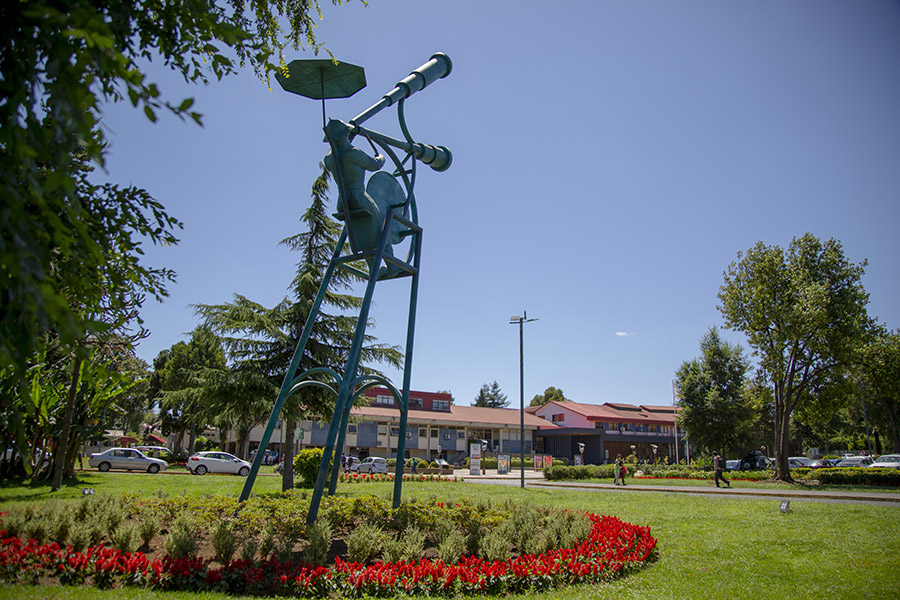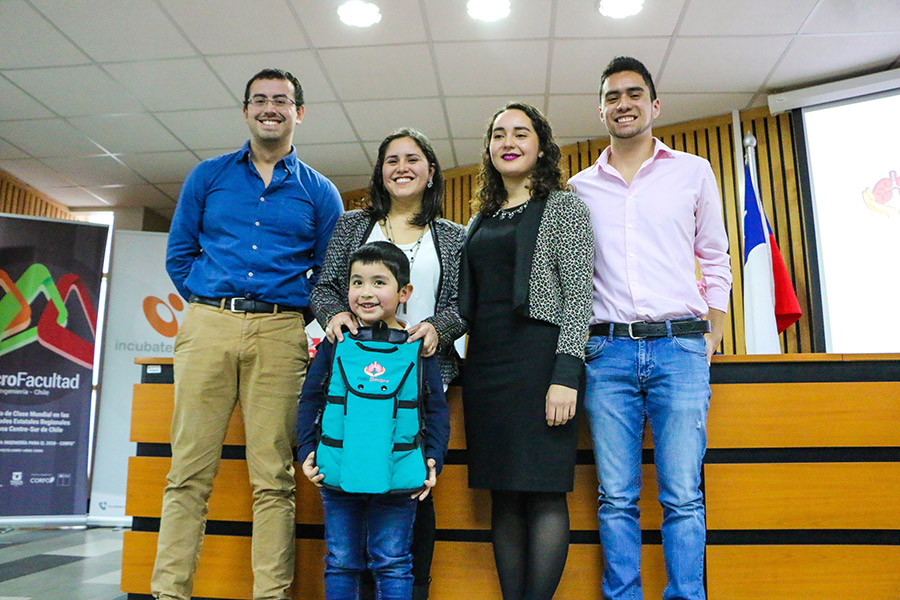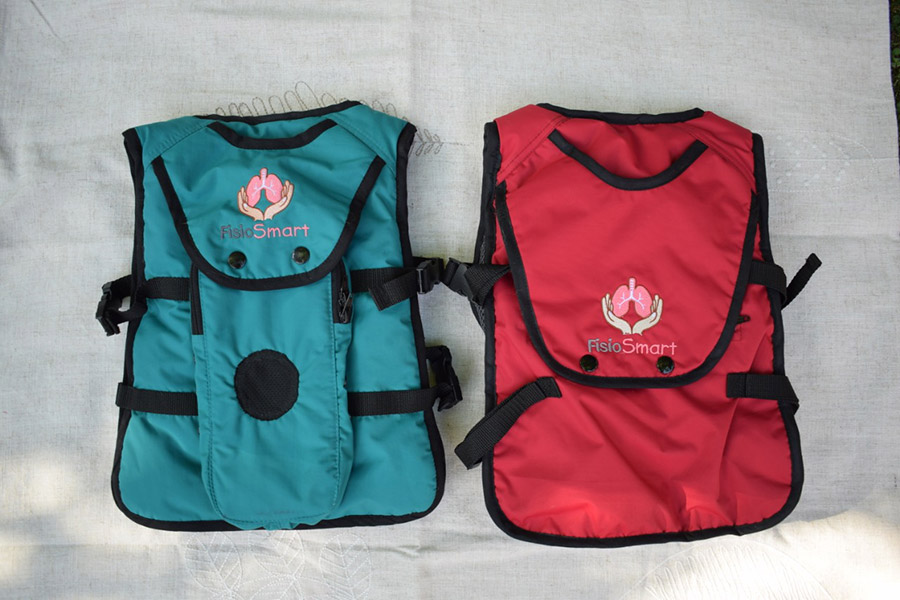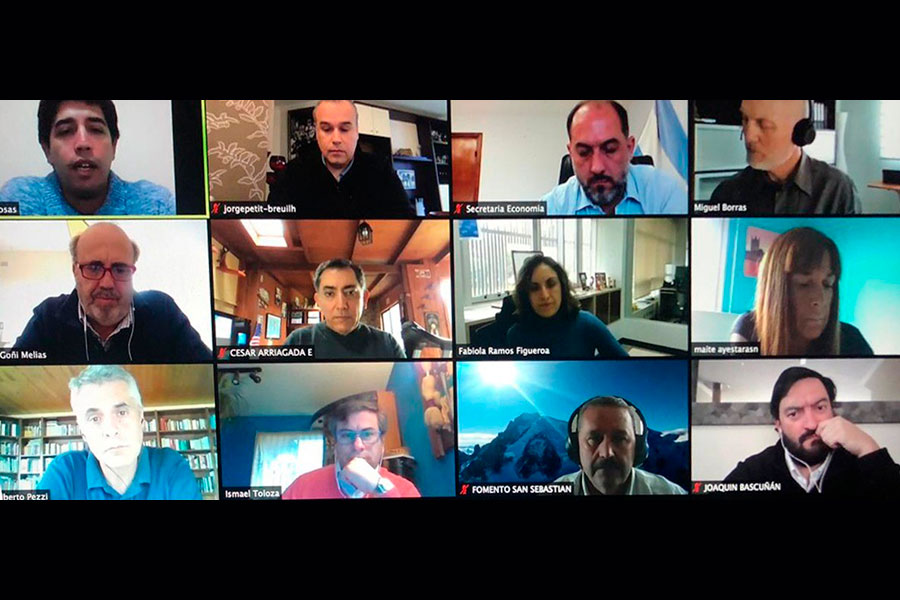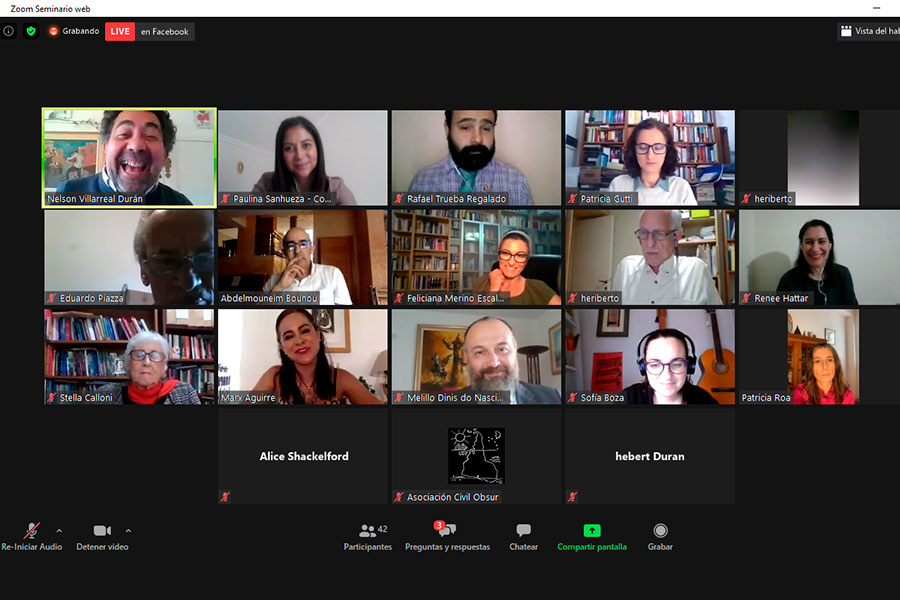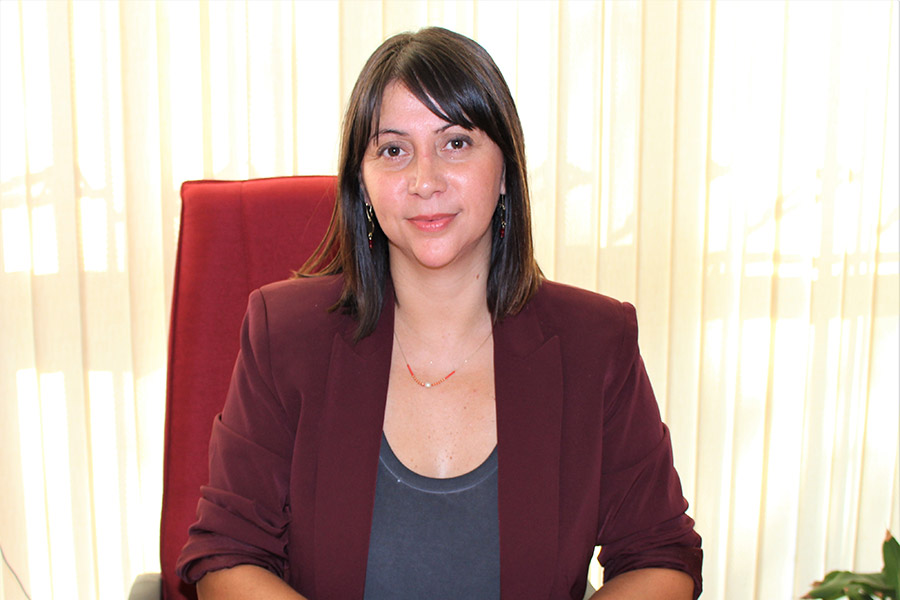|
24 out of 63 awarded projects are from regional universities and UFRO is in fourth place with five projects. |
The university Universidad de La Frontera (UFRO) has been playing an important role at the regional and national level in the context of the current global health crisis. They have been adding up their scientific and technological capacities to face all the challenges this pandemic brought. The social commitment of this institution has been characterized by the contribution of its specialists, laboratories and researchers, and now, five projects of the university were awarded in the Research Project Competition of the Chilean National Agency for Research and Development (ANID), for the fast allocation of funds for research projects on COVID-19. At the national level, 63 projects were awarded, of which 24 are from regional universities. UFRO is in fourth place with 5 projects. The researchers in charge of these projects are Dr. Víctor Beltrán, Dr. Valeska Geldres, Dr. Jaime Inostroza, Dr. María Román and Dr. Carlos Zaror. In addition, the university is also participating as an associate institution in two other projects. “This news fills us with pride, not only because it positions us among the institutions with the highest number of awarded projects, but also because it shows that – as a public and state university – we are aware of the needs of our environment and that we are an important contributor in the fight against this pandemic and in this global health crisis,” said Dr. César Arriagada Escamilla, the Vice-rector for Research and Graduate Studies at UFRO. The university authority congratulated the academic staff that participated in this competition and emphasized that more than a thousand projects had been submitted. “We recognize the commitment of those who submitted their competitive proposals in a complex scenario that demands greater efforts in all our activities,” he added. The Director of the Office for Innovation and Technology Transfer, Franklin Valdebenito, explained that the projects will provide new knowledge within the different fields of research, with appropriate solutions for these critical times the country and the world are going through. “These projects have a strong local focus, but with global reach. Besides, they strengthen important alliances that allow us to continue our progress together, based on our skills in science, technology and innovation.” THE PROJECTS The competition by ANID, for the fast allocation of funds for research projects on COVID-19, was meant for research projects that investigate the SARS-CoV-2 Coronavirus or COVID-19 disease, focusing on the diagnosis, control, prevention, treatment, monitoring and/or other aspects related to this infectious disease and its consequences from a scientific, technological, health-related, social, economic, cultural and humanistic perspective.
Here is a list of the awarded projects of UFRO: Clinical practice guidelines for safe dental care in times of COVID-19 Dr. Carlos Zaror Sánchez, Faculty of Dentistry Evaluation of the epidemiological and clinical characteristics of the infection caused by SARS COV-2 in COVID-19 immunosuppressed patients in the region La Araucanía (Chile) and Barcelona (Spain) Dr. Jaime Inostroza Sarmiento, Faculty of Medicine. Impact of the Covid-19 pandemic on mental health: longitudinal study of anxiety and depression symptoms and risk behavior in communities in the Chilean regions Coquimbo and La Araucanía Dr. María Román Mella, Faculty of Education, Social Sciences and Humanities. Impact of the COVID-19 crisis on the export competitiveness of food companies in the south of Chile Dr. Valeska Geldres Weiss, Faculty of Law and Business. Semi-virtual technological platform in support of emergency and priority dental care for senior citizens in the context of the Covid-19 pandemic in the Chilean population Dr. Víctor Beltrán Varas, Faculty of Dentistry.
Written by: Karimme Riadi Millas Vice Rectorate for Research and Graduate Studies
|
|
FisioSmart is currently carrying out a campaign to donate kinetic vests to patients who are unable to receive their treatments because of COVID-19. |
Since 2018, FisioSmart has gradually positioned itself at the regional and national level. What started as a project that won the “Experimentando” (“experimenting”) contest of the Macro Faculty of Engineering of the Universidad de La Frontera (UFRO) back then, has managed to evolve, and now the design is used as a pilot project at the Hospital of Los Ángeles (Chile). FisioSmart is an intelligent kinetic vest that removes secretions from the airways and allows patients with cystic fibrosis or obstructive diseases to receive a therapy that helps them to live their daily lives. Today, because of the global health crisis, families with members with this disease are facing a complex situation, as they are unable to attend health care facilities due to the risk of contagion. In this context, FisioSmart is leading the “My Lungs Move” campaign, which seeks to donate 50 kinetic vests to patients all over Chile, together with the Corporation for Cystic Fibrosis of the Pancreas. “This kind of patient requires a strict treatment and today, unfortunately, they have no access to it, since they can’t go to the hospitals or healthcare centers because of the risk of contagion of COVID-19, which could be fatal for them,” José Portiño, a civil industrial engineer, says. MULTIDISCIPLINARY WORK FisioSmart was founded in 2018, within a project that participated in the contest “Experimentando” of the Macro Faculty of Engineering of UFRO. The team of the Universidad de La Frontera is comprised of José Portiño, a civil industrial engineer, Mayra Sepúlveda, a physical therapist, Emiliano Delgado, who is a student in commercial engineering and Silvana Mellado, who is studying physiotherapy. FisioSmart is a multidisciplinary initiative with professionals from different fields. How do you think that this fact enriches the work they are doing? All the progress we made and the results we have obtained so far are based on the fact that we are a multidisciplinary team. This aspect is very significant, since it allows us to delegate tasks to the respective fields of expertise and thus to move forward together, and in the same way in several areas at the same time. At present, our goal is to provide technological solutions to social problems that frequently are not being addressed in our country or need a lot of money. We want to bring the technology closer to the people, so that it becomes accessible for everyone. As a team, you won the contest “Experimentando” of the Macro Faculty of Engineering in 2018. How did this help you with your future development? To win that contest was the basis for all further development. Thanks to the prototype created within that project, we were able to get a PRAE project awarded by CORFO. After that, with these results and the working prototype developed, we got a VIU project approved from Fondef, for medical device validation, and we are currently working on the "My Lungs Move" campaign, in order to provide help to those who need it. Besides the current campaign, what are the future plans and challenges for the project? Right now, our priority is the campaign. It is absolutely necessary that every child who is not able to attend kinetic therapy receives a vest that allows them to continue with it; besides of the aim of improving their quality of life. Written by: Mauricio Antivil |
|
It is an important step forward for the UFRO program in terms of international cooperation and the innovation of teaching. |
The Doctoral Program in Communication, which is imparted by the universities Universidad de La Frontera (UFRO) and Universidad Austral de Chile, has recently been incorporated to the international network Laspau Co-Lab of Harvard University. The mission of this network is to strengthen the quality and impact of higher education and it is an important recognition of the management, which has been promoting the program’s internationalization. This achievement opens up new opportunities for scholarship programs and the innovation of teaching. Dr. Carlos del Valle Rojas, the director of the doctoral program, stressed that there has been an emphasis on internationalization, since they believe that it is one of the key factors for a doctoral program. “We had the opportunity to join this collaborative network of Harvard University, which has the mission to strengthen higher education. Our incorporation is based on our collaboration with the University of Groningen in the Netherlands, with which we have developed a double degree agreement and joint publications,” he explained. The network of Laspau Co-Lab is mainly oriented towards teaching, innovation and the collaboration between universities in North, Central and South America. In this context, Dr. del Valle added that the PhD students of UFRO will benefit from this link through the scholarship system offered by the network and through the possibility of incorporating the Perusall platform, which will be a great support for the classes of the program and which will achieve an important innovation of teaching, since it is a tool that allows the students to do their readings in a more collaborative, participative and interactive way. “An optimal preparation of the basic readings for the contents of the courses is essential for us, and Perusall works with leading open access university publishers, such as Harvard University Press, Cambridge University Press, Oxford University Press, Princeton University Press, University of Michigan Press, and so on,” he said. In this context, Dr. del Valle pointed out that, as a first step, the aim is to make the Perusall platform available for the different courses and to get access to the network’s scholarships. Then, as a second step, the idea is to carry out joint activities, such as joint publications, seminars and research projects, with an international outlook and global importance. WEBINAR As a next step, and as one of the first activities within this network, the doctoral program is organizing a webinar that will take place on September 24, about the use of Perusall as a teaching support tool. This webinar will be led by Dr. Pablo Valdivia, an academic member of the doctoral program at UFRO, and John A. Paulson, a researcher of the School of Engineering and Applied Sciences at Harvard University. Written by: UFRO Communications Office
|
|
The online conversation brought representatives from the Basque Country, Catalonia, Valencia, Mexico, Colombia, Argentina and Chile together. |
“Visions of the future” was the name of the conference organized by the Institute of Local and Regional Development (IDER) of the Universidad de La Frontera (UFRO), which brought representatives from the Basque Country, Catalonia, Valencia, Mexico, Colombia and Argentina, as well as from Chilean universities and UFRO together. During the meeting, the participants analyzed different alliances in accordance with each country’s visions and perspectives of the future, the construction of sub-national information, technological watch and other issues that will affect the post-pandemic reconfiguration of these countries. According to Camilo Rosas, the acting director of IDER-UFRO, “the meeting was organized in consideration that, after the pandemic, we are going to need a collaborative strategy between all the actors who are thinking about development within specific geographical conditions. The intention was to share experiences, points of view and to explore new possible ways of collaboration in order to be able to continue contributing to the development of our respective territories, by strengthening our relationships of reciprocal collaboration and by carrying out joint initiatives”. It should be noted that the Institute has been working for almost 20 years and currently consists of five units, being in charge of community planning, statistical analyses, technology watch, public policies and further training, as well as the development of its renowned graduate program in human development in the south of Chile. Written by: IDER-UFRO |
|
The academic member of the Faculty of Law and Business had an important role in the dialogue about the potential impacts of the current pandemic. |
Dr. Paulina Sanhueza is an academic member of the Department of Management and Economics of the Faculty of Law and Business (FCJE) of the university Universidad de La Frontera (UFRO). In her role as a general coordinator of the Ibero-American Network of Development Studies (RIED), she participated in the international online seminar called “Perspectives on the impacts of the pandemic”, which is an initiative that has its origin in the collaboration between the Institute of History of the Faculty of Law of the University of the Republic (Uruguay) and RIED. The objective of the seminar was to discuss and clarify the potential impacts of the current pandemic and health crisis that the world is facing on the economy and on social, cultural and environmental aspects. Dr. Sanhueza indicated that there is no doubt that we are currently facing one of the deepest recessions since the beginning of the 20th century; with significant negative effects on economic growth, and significant increases in the levels of unemployment, poverty, exclusion and inequality. In this regard, she pointed out that “the academic network – I currently have the honour of coordinating it – wants to help. It wants to become a space for the promotion and facilitation of capacities and to create a dialogue that provides knowledge and contributes to the dissemination of different experiences regarding the pandemic and its effects on global and territorial processes of development”. Twelve international speakers, who all have extensive experience from their work in higher education institutions and international organizations, such as the ILO, UN Women and others, attended the seminar. They presented and discussed the experiences of Brazil, Mexico, Spain, Argentina, Morocco, Chile, Jordan, Costa Rica, and Uruguay and addressed aspects related to the relationship between COVID-19 and the different dimensions of development from different disciplinary perspectives. Written by: Karen Campos
|





